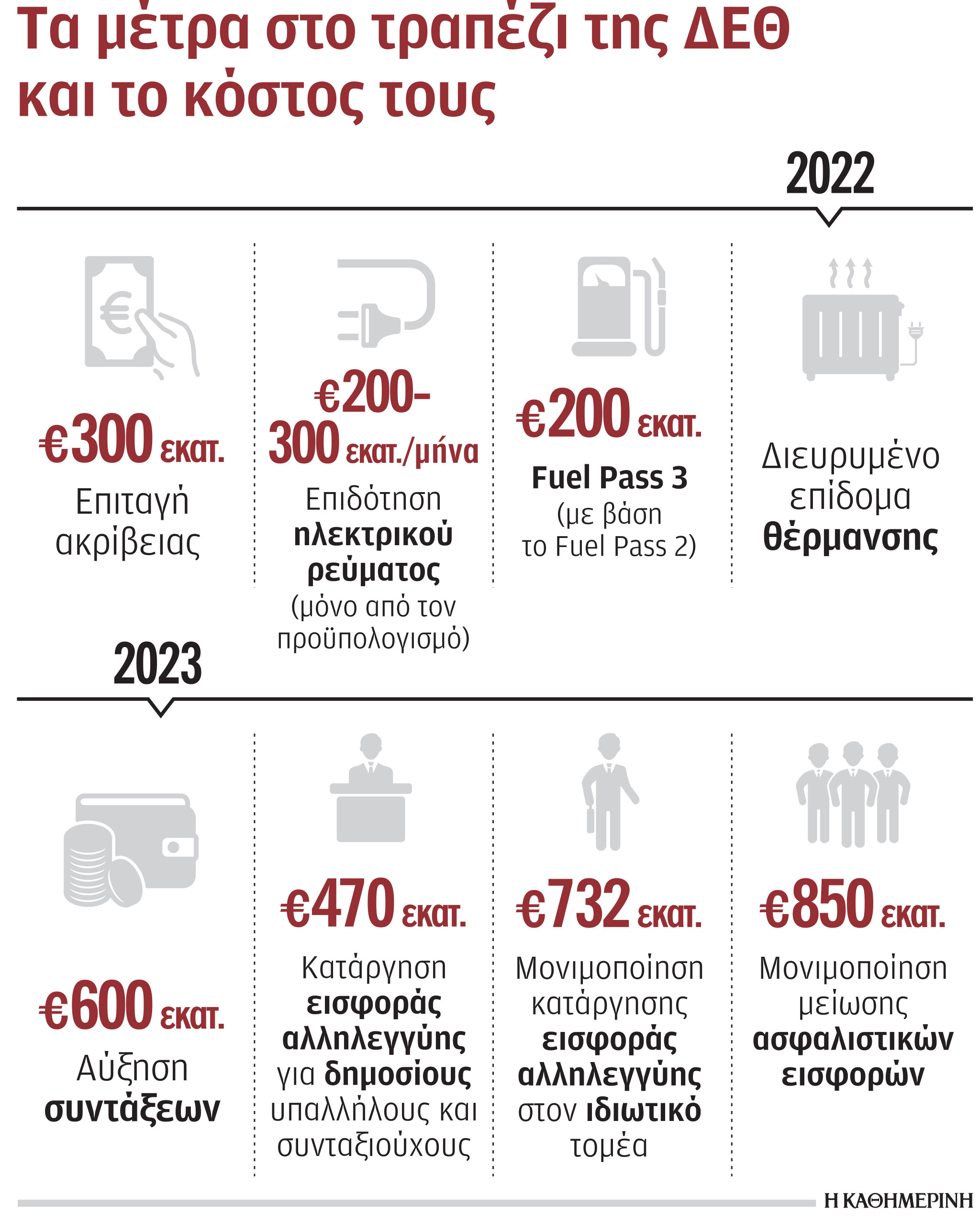
Retirees and civil servants are expected to play a major role in this year’s TIF package to be announced by Prime Minister Kyriakos Mitsotakis on September 10, while additional support is also being considered for vulnerable populations, possibly with a new “accuracy test” .
The two main announcements that have already been resolved and essentially announced, although not in detail, are the increase in pensions in 2023 for the first time in 12 years and the abolition of the solidarity collection, followed by private and public employees, as well as pensioners. , also from 2023. Thus, this large part of the electorate again comes to the fore in an election year, for example, in the next one.

Of course, the cost of these two measures is not negligible:
1. The increase in pensions is estimated at 6-6.5% and in this case will fall on the budget of approximately 600 million euros. This percentage is calculated based on an allowance for the Commission’s summer forecasts for inflation of 8.9% and growth of 4%. Economists are now hoping that inflation could eventually close lower as they prepare a new macroeconomic scenario. However, they do not consider it likely that pension growth will fall below 6%.
2. The abolition of the solidarity levy for civil servants is 200 million euros and for pensioners 270 million euros, the total cost is 470 million euros. For the private sector, the cost of the measure, which is already temporary and will become permanent from 2023, reaches 732 million euros. It is noted that the abolition of the solidarity collection applies to incomes over 12,000 euros.
Taking into account the above, the increase in pensions and the abolition of the solidarity contribution, the benefit for pensioners in 2023 will amount to 870 million euros.
An increase in pensions, the abolition of solidarity collection for civil servants and a “punctuality check” for vulnerable segments of the population.
But there could also be an additional boost for civil servants if the abolition of the 1% withholding in favor of the Wealth Fund, which they now pay, is finally approved. However, no decision has yet been made on the measure.
Moreover, the “accuracy check” will cost more than 300 million euros, as it is similar to the last one, Easter, but it is not permanent. It will be issued towards the end of the year and will be a key measure to support revenues in 2022, in addition to the possible resumption of fuel passes for the last quarter and an increase in the heating allowance.
For retirees, the finance department wants to draw a red line with hindsight, limiting compensation to those who sue, not everyone. Also, according to information from his sources, a new reduction in insurance premiums is not considered, since they believe that what has already been done, that is, by 4.4 percentage points, is more than enough. The cost of the measure, which will become permanent from 2023, is 850 million euros.
For the private sector, it is envisaged to accelerate the new increase in the minimum wage, which, however, does not incur fiscal costs, if it does not bring benefits to the budget.
At the same time, the prime minister’s office is also working on the ideas he developed in May last year to offer housing for young people, and it is possible that he will make a corresponding report to the TIF. The focus is on creating incentives to increase housing supply. The use of public property through PPPs, the construction of student residences by universities and the provision of incentives for the use of closed private property or disincentives for those who keep it closed are being considered.
The threat of a recession and an uncertain 2023
Even if July revenues, which will be announced next week, well above forecasts, breathe life into the budget and allow for new support measures, the uncertainty about the future is so great that it could shake any planning in the air. Unfavorable scenarios are highly likely, including continued high energy prices and recession in Europe. Government sources estimate that central banks will deliberately choose recession over inflation. And, as they say, the recession in Europe will sooner or later affect the Greek economy, even if it is now being saved thanks to tourism. Against this challenging backdrop, the government is called upon to exercise fiscal prudence and run primary surpluses next year, hoping to meet its next big goal of investment grade. The finance department claims to “keep ammo” in case of possible wear and tear. However, there must be many. Suffice it to say that the April stability program did not include support for electricity bills, which will certainly be needed. The Treasury Department currently estimates spending between 200 million and 300 million per month to support the accounts, which, if continued in 2023, will offset a projected primary surplus of 1.1% in 2023. Whether this target will change for 2023, as in 2022 for a primary deficit of 2% of GDP, remains to be seen in the next two months, when the supplementary budget for this year and the draft budget for 2023 are presented. a possibility, but the uncertainty is so great that nothing can be ruled out.
Source: Kathimerini
Lori Barajas is an accomplished journalist, known for her insightful and thought-provoking writing on economy. She currently works as a writer at 247 news reel. With a passion for understanding the economy, Lori’s writing delves deep into the financial issues that matter most, providing readers with a unique perspective on current events.